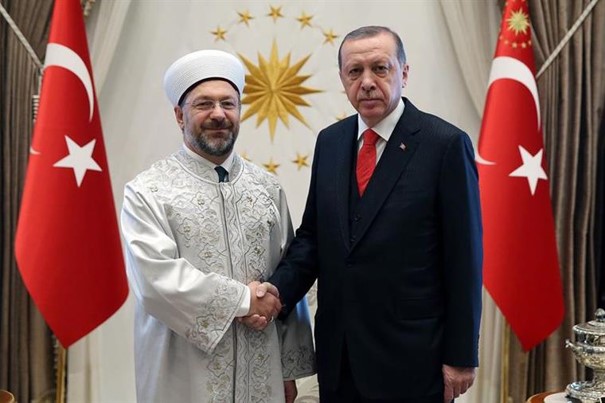Levent Kenez/Stockholm
Turkey’s Directorate of Religious Affairs, or Diyanet, has unveiled an extensive international expansion plan for 2025, aiming to reach 2.1 million people abroad through religious services, educational programs and cultural initiatives. The move underscores Ankara’s increasing reliance on the Diyanet as an instrument of soft power, particularly in Europe, Central Asia and Africa.
The Diyanet, initially established by the Turkish state to counteract radicalism, has undergone a fundamental transformation during President Recep Tayyip Erdogan’s 23-year rule, evolving into a key tool for propagating political Islam, reminiscent of the ideology of the Muslim Brotherhood, both within Turkey and internationally.
According to its 2025 performance report obtained by Nordic Monitor, the Diyanet is set to expand its presence in Western Europe and Africa, with a particular focus on countries with large Turkish diaspora populations, including Germany, France, the Netherlands, Belgium, Austria and Switzerland.
Beyond Europe, the Diyanet is intensifying efforts in the Balkans and Central Asia, where it plans to fund mosque construction, support local religious education and train imams to promote Ankara’s interpretation of Islam. In Africa it will provide scholarships and establish partnerships with religious institutions in several countries, further expanding Turkey’s religious influence.
The Diyanet’s 2025 performance report:
As part of its expanding global outreach, the Diyanet is set to launch a series of new initiatives aimed at strengthening its influence among Turkish communities abroad and reaching the wider Muslim audience. These efforts include the publication and international distribution of religious texts in multiple languages, including Arabic, English, French, German and various Balkan languages. Additionally, the Diyanet is expanding its online religious education platforms to provide structured training programs for diaspora communities.
Another component of this strategy is the increase in scholarships for international students, particularly those pursuing Islamic studies in Turkey. The institution also plans to host foreign students for specialized theological training, further embedding its religious framework in global academic circles. To solidify its standing as a religious authority, the Diyanet will organize international conferences and academic symposiums, seeking to enhance its legitimacy on the world stage.
To ensure the effective implementation of these initiatives, the Diyanet is strengthening coordination with Turkish and foreign embassies and consulates and local Islamic institutions, reinforcing its presence across multiple countries.
The Diyanet also urges the recruitment of Turks who are already citizens of these countries, recommending their training in Turkey before assigning them as imams. To support this initiative, the Diyanet has allocated 608 million Turkish lira ($17.3 million) for the program. Over 1,000 students from Europe and North America have been educated and trained in Turkey, with many already assuming positions within the Diyanet.

For instance, the Turkish-Islamic Union for Religious Affairs (DİTİB), the Diyanet’s German branch, will launch a new training program in 2025. Under this initiative, 75 graduates from Turkish faculties of theology or Islamic studies will be sent to Germany annually to participate in a two-year training program at the DİTİB Academy in Dahlem, North Rhine-Westphalia. Upon completing their training, they will be appointed as imams in DİTİB-affiliated mosques and required to serve for a minimum of 10 years. Those who fail to fulfill this commitment will face financial penalties.
European intelligence agencies have previously raised concerns that DİTİB and other Diyanet-affiliated institutions are being used for surveillance, propaganda and intelligence-gathering activities, particularly targeting Erdogan’s critics in the diaspora.
Several European governments, including those of Germany and Austria, have launched investigations into Diyanet mosques and religious centers over allegations of spying on opposition figures and activists. In response, Ankara has dismissed such claims as “unfounded,” accusing host countries of Islamophobia and discrimination against the Turkish-Muslim diaspora.
Germany has also expressed concerns over Diyanet-appointed imams, whose salaries are paid by the Turkish government. German officials cite their lack of integration into German society, political involvement and inability to speak the local language as significant issues.
The Diyanet has been allocated a staggering 130.1 billion Turkish lira ($3.7 billion) for 2025, surpassing the budgets of several key ministries, including the Interior, Foreign Affairs, Energy and Natural Resources, Culture and Tourism, Industry and Technology and Trade ministries. Due to the depreciation of the Turkish lira against the US dollar, additional budget allocations are made throughout the year for state institutions with overseas operations, including the Diyanet, to compensate for rising costs.
The Diyanet operates a vast and influential network, overseeing 89,817 mosques across Turkey and hundreds more abroad. The organization employs an impressive 143,429 personnel, primarily consisting of imams who play a key role in leading religious services and engaging with local communities. In its international operations, the Diyanet has a total of 644 staff members, including 79 permanent employees and 565 contracted personnel.












